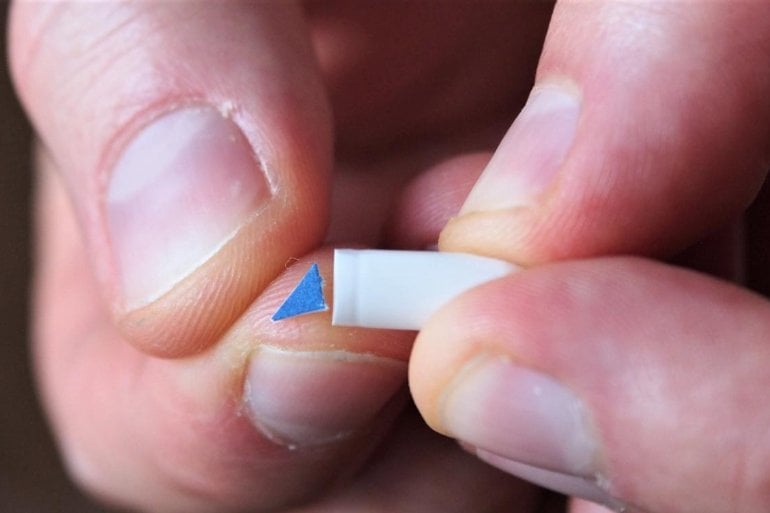Summary: A placebo-controlled study of psychedelics reveals the psychological benefits of microdosing are most likely explained by the placebo effect.
Source: eLife
Positive psychological effects associated with taking small doses of psychedelic drugs are likely the result of users’ expectations, suggests a study published today in eLife.
The study – the largest placebo-controlled trial on psychedelics to date – used an innovative ‘self-blinding citizen science’ approach, where members of the public who were already microdosing implemented their own placebo control following online instructions. The results from the trial may influence future studies in real-world settings.
There has been renewed interest in studying whether psychedelic drugs may be a useful treatment for depression, addiction, obsessive-compulsive disorders and other conditions.
Few small studies have previously suggested that microdoses – small doses of psychedelic drugs taken one to three times a week – may improve people’s wellbeing, creativity and overall cognitive performance. But many of the studies lack a control group of participants taking a dummy pill to determine if these positive outcomes are the result of the drug’s action, or the result of the participants’ expectations of a benefit – the so-called placebo effect.
“Anecdotal reports about the benefits of microdosing are almost certainly biased by the placebo effect,” says lead author Balázs Szigeti, a research associate at Imperial College London, UK.
Szigeti and his colleagues designed a citizen science study where individuals who were already microdosing could participate online. First, the 191 participants followed a setup procedure that mixed placebo pills with microdose ones. After the setup, the participants had a set of capsules without knowing which were placebo and which were microdose. The authors call this process ‘self-blinding’, as participants lost knowledge of which drug they were taking.
The setup included barcodes which, when scanned, linked to the study’s IT infrastructure and allowed the researchers to track who had taken microdoses or placebos. The participants then filled out surveys about their experiences and completed online cognitive tests, while they took the pills over a four-week period.
Participants who were taking the real psychoactive drugs and those unknowingly taking the placebos reported similar psychological benefits. “Our results are mixed: on the one hand, we observed microdosing’s benefits in a wide range of psychological measures; on the other hand, equal benefits were seen among participants taking placebos,” Szigeti explains.
“These findings suggest that the benefits are not due to the drug, but rather due to the placebo-like expectation effects. Many participants who reported that they experienced positive effects while taking the placebo were shocked to learn after the study that they hadn’t been taking the real drug.”
The authors caution that the results are not as reliable as the results from a traditional placebo-controlled study, due to participants sourcing their drug from the black market. However, the team’s citizen science approach accurately reflects ‘real-life microdosing’ – that is, how microdosing is done in practice.

Additionally, the study cost a fraction of what a traditional clinical study would cost, which may make it a useful first step in assessing whether other popular phenomena can be explained by the placebo effect.
“The successful execution of this study could inspire similar studies in a broad range of scientific or medical contexts,” says senior author David Erritzoe, Clinical Senior Lecturer in Psychiatry at Imperial College London.
“Accounting for the placebo effect is important when assessing trends such as the use of cannabidiol oils, fad diets or supplements where social pressure or users’ expectations can lead to a strong placebo response. Self-blinding citizen science initiatives could be used as an inexpensive, initial screening tool before launching expensive clinical studies.”
About this psychology research news
Source: eLife
Contact: Emily Packer – eLife
Image: The image is credited to Szigeti et al.
Original Research: Open access.
“Self-blinding citizen science to explore psychedelic microdosing” by Szigeti et al. eLife
Abstract
Self-blinding citizen science to explore psychedelic microdosing
Microdosing is the practice of regularly using low doses of psychedelic drugs. Anecdotal reports suggest that microdosing enhances well-being and cognition; however, such accounts are potentially biased by the placebo effect.
This study used a ‘self-blinding’ citizen science initiative, where participants were given online instructions on how to incorporate placebo control into their microdosing routine without clinical supervision.
The study was completed by 191 participants, making it the largest placebo-controlled trial on psychedelics to-date. All psychological outcomes improved significantly from baseline to after the 4 weeks long dose period for the microdose group; however, the placebo group also improved and no significant between-groups differences were observed.
Acute (emotional state, drug intensity, mood, energy, and creativity) and post-acute (anxiety) scales showed small, but significant microdose vs. placebo differences; however, these results can be explained by participants breaking blind.
The findings suggest that anecdotal benefits of microdosing can be explained by the placebo effect.







